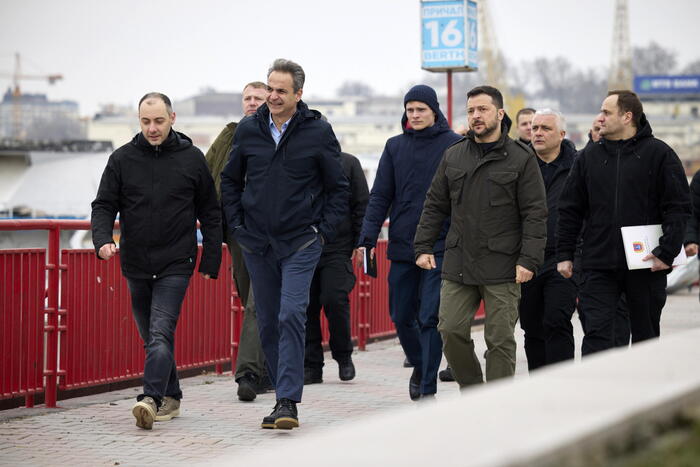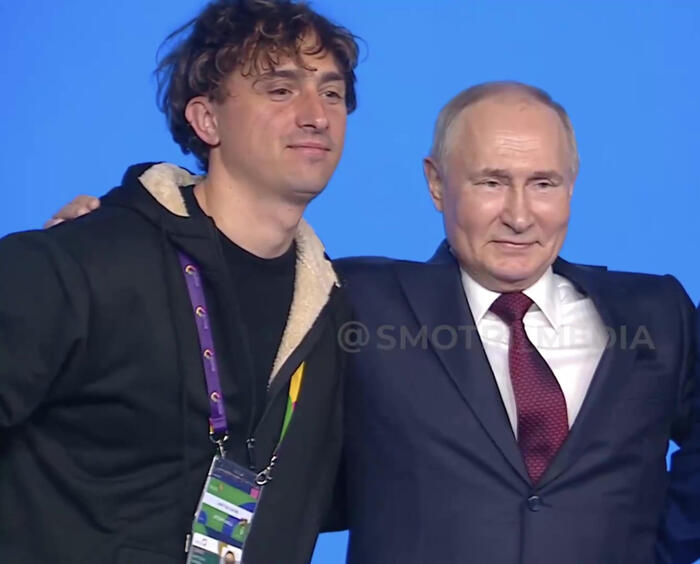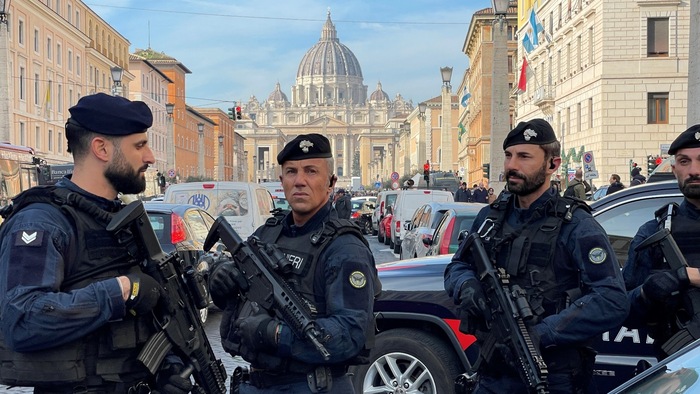Aliona Popova has often watched the CCTV video: How she stands before the State Duma in Moscow, in her right hand a life-size cardboard with the image of Leonid Sluzki, the chairman of the Foreign Affairs Committee. He should have verbally harassed and even touched parliamentary correspondents.
Whenever she turns her head to the right, the camera zooms in. One, two or three times, that's how it goes - it counts, in the four hours that have been recorded, it is 40 times in the end.
"Who has an interest in picking up my face? Why?" She asks. The pictures are from the spring of last year, Sluzki is still in office - protests like that of Popowa defiance. She was arrested and fined. In the trial against her, the video was shown as proof.
A permanent place in the database
Popova not only infuriates the verdict, after all, she was alone before the Duma, which is actually allowed by Russian law. She is sure that her face is already stored in one of the authorities' databases, that the camera is zooming in to identify her. The police spoke to her by name during the arrest, but she had not yet expelled herself.
She still does not know who owns the camera and what database her data is in. She wrote to the authorities - everything went according to the law, it was said.
Popowa does not want to believe in it, also because in August 2018 the activist Mikhail Aksel was temporarily arrested in a metro station. Cameras have identified him as a supposed criminal, a police officer told a member of an opposition party. A member of a police force working against extremism had fed his photo into the criminals' wanted database. When asked how he could be erased from the database, a police officer had answered him: "Not at all."
The authorities inform only sparsely
Mayor Sergei Sobyanin has announced that in the coming year, all surveillance cameras of the city of Moscow - that is more than 200,000 - will be equipped with face recognition software. He wanted to make Moscow one of the safest cities in the world, using one of the largest surveillance systems, comparable to some cities in China.
The cameras are located in the metro, schools, parks, but also in the entrances and courtyards of the Russian capital. Thousands more each year, and almost all have access to the authorities.
After the summer protests, it became known in early September that the Moscow City Information Technology Department has purchased 260 million rubles, around 3.6 million euros, in technical services and analysis for video recording, including facial recognition. They should be used in "major events", including political demonstrations.
Dmitry Serebryakov / ITAR-TASS / imago images
Security cameras at a lamppost near the Kremlin
Already, at least 3000 of the cameras in Moscow work with face recognition. The authorities publish only a few details:
- Facial recognition software was already used in Moscow during the 2018 FIFA World Cup, for example in the areas around the stadiums, but also in metro stations. Which were exactly, is not clear to this day.
- A metro test for a faces recognition program was conducted at a subway station in the capital. Which result ended, is not known.
- 100 offenders have already been caught thanks to face recognition software, said Interior Minister Vladimir Kolokolzew recently.
As so often in Russia, the authorities create facts. Unlike in Western countries, where the balance between public security measures and protection of privacy is being fought, there is no public debate.
"Who collects data about you owns you"
Popova, known in Russia for her commitment to women's rights, has begun a new fight over her data. "They track us seven days a week, 24 hours a day, anywhere, not just in safety-critical locations like airports," she says. "We need to understand better how the face recognition system works." She fears a "digital dictatorship": "Who collects data about you, owns you".
Popova is supported by IT experts such as Alexey Sidorenko: "The problem in a country like Russia is that people have no way to control the security organs, they do what they want."
Human rights activists such as Damir Gajnutdinov of the Agora organization point to the telephone monitoring: "Formally, the security authorities need a court order, in practice they get it in 98 to 99 percent of cases, almost always." The lawyer warns that it is not just about fighting crime, but also the pursuit of critics. In addition, in corrupt Russia there is a risk that databases of biometric information will end up on the black market.
FSB certified
The city of Moscow has not yet published the announced call for tenders for the face recognition software, as confirmed by the company Ntechlab SPIEGEL. It wants to apply. The company had released the program FindFace, which was still available until last year, the algorithm made headlines with its high hit rate.
Meanwhile, the secret service FSB has certified the algorithm. The error rate is only one in 15 million, as Alexander Minin, chief executive of the company, says. Collecting and storing biometric data for facial recognition is "one of the most regulated areas in Russia," he says. Above all, he calls Popova's approach PR in his own right.
Force information by action
This rejects the activist. She says she is concerned with enlightenment. Popova is sitting on Wednesday with her three lawyers in a court near the Belarusian railway station. She has sued the Ministry of Interior, the media regulator Roskomnadzor and the information technology department. The activist wants to receive more information that prohibits the used face recognition software.
The journalists crowd in the small meeting room. "I'm against total surveillance," says Popova. She sees her rights violated. It relies on Article 23 of the Constitution, which states that everyone has a right to privacy, and the Personal Data Act, which prohibits the collection of data, including biometrics, without the consent of the person concerned. Now Popova also knows that there are many laws in Russia on paper, but the reality is different.
She wants to know from the lawyers of the other side, which biometric data are collected. There is no such information, says the lawyer representing the information technology department. "We are not following any citizens." You know no Mrs. Popova, have only cameras, no databases.
It owns the Ministry of the Interior, as its lawyer confirmed, but allegedly only with information about criminals - and yes, he says at some point, you have biometric data. He is sweating. Three and a half hours go back and forth, the lawyers of the defendant authorities make every effort to stay as vague as possible.
In the end, the judge reads the verdict: "Action dismissed."
Popova expected that, to prepare for a long fight. "As always, you need a plan in Russia, B, C and D - and we have them." It announces the appeal and actions of other citizens.








